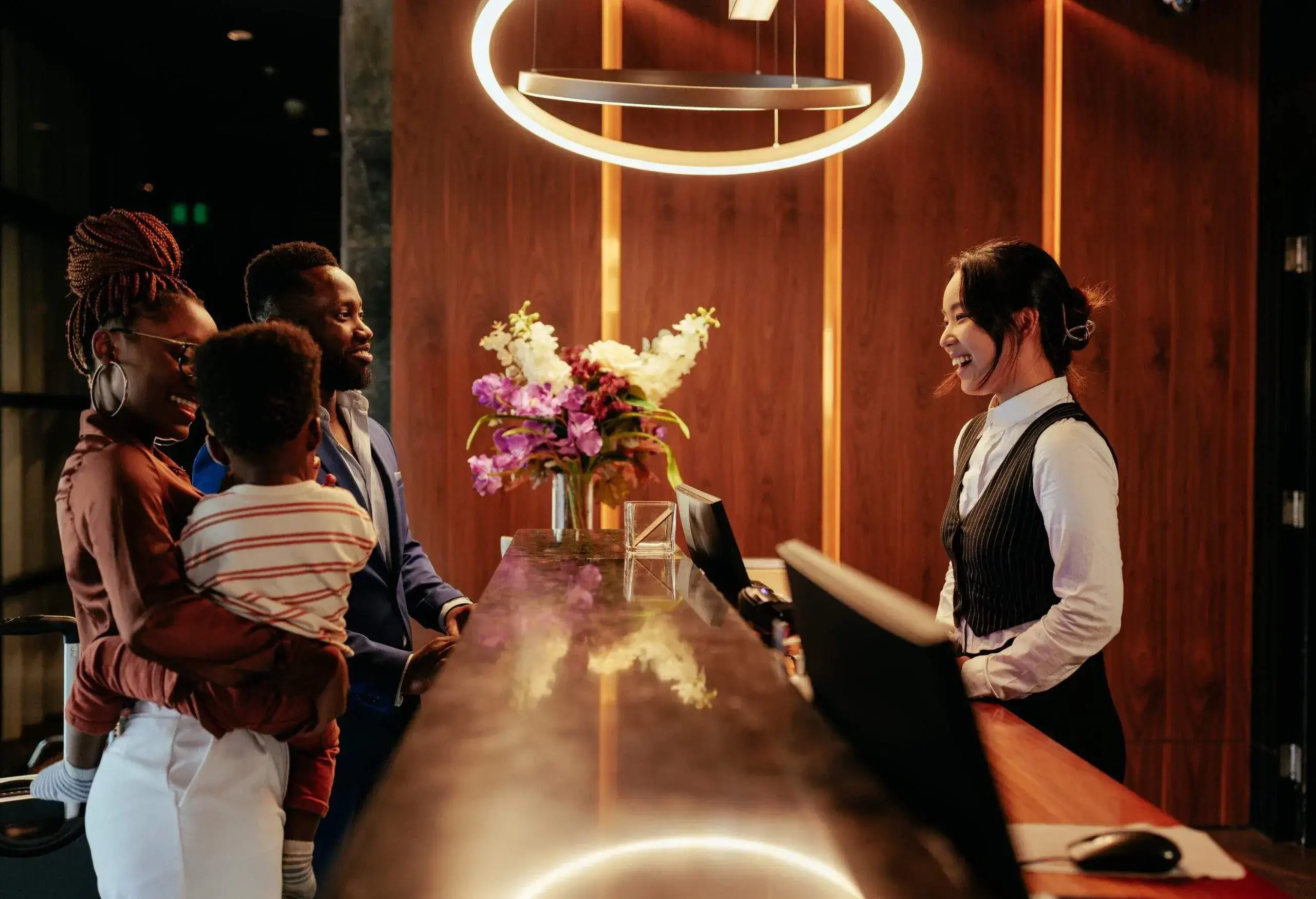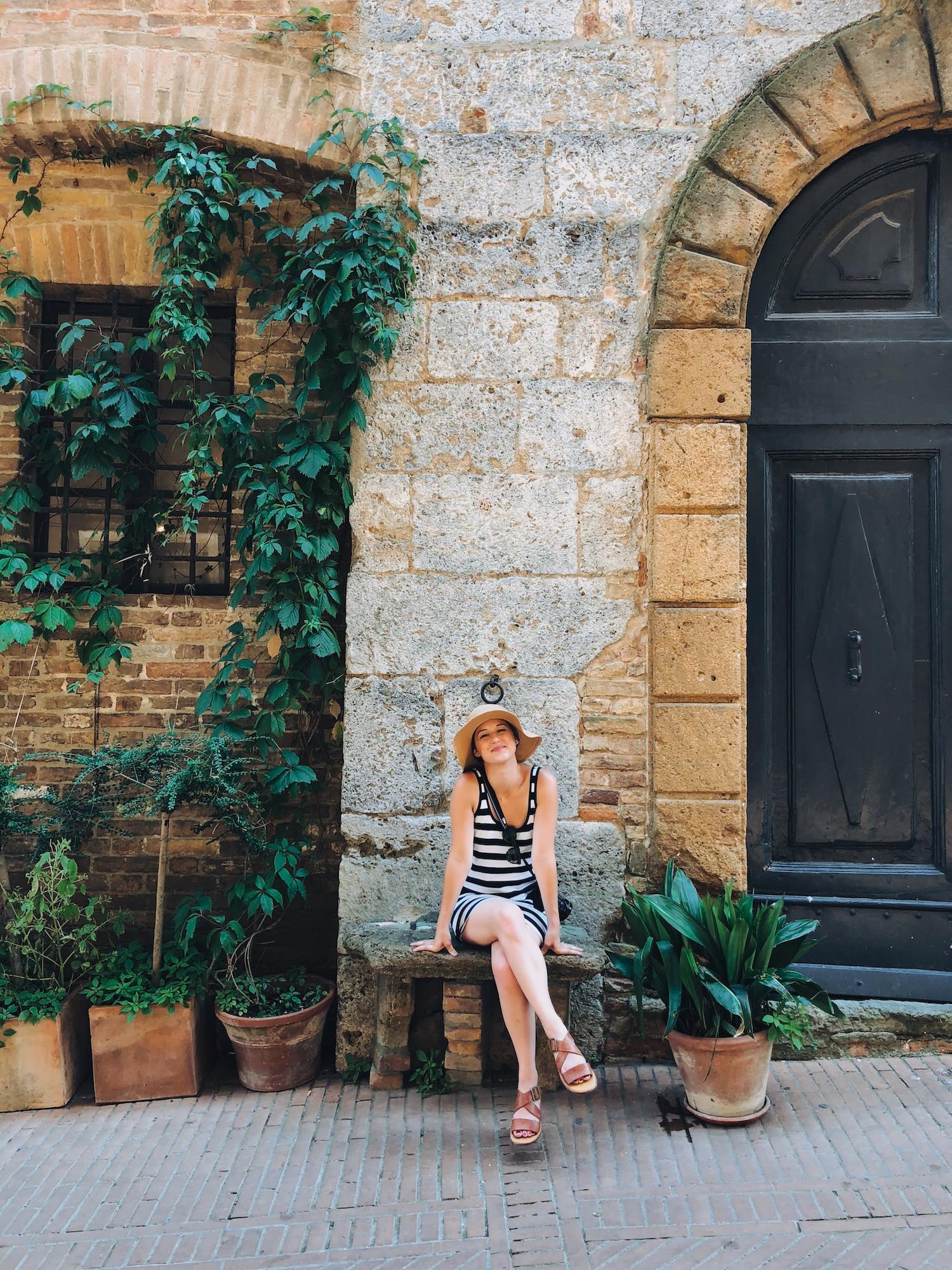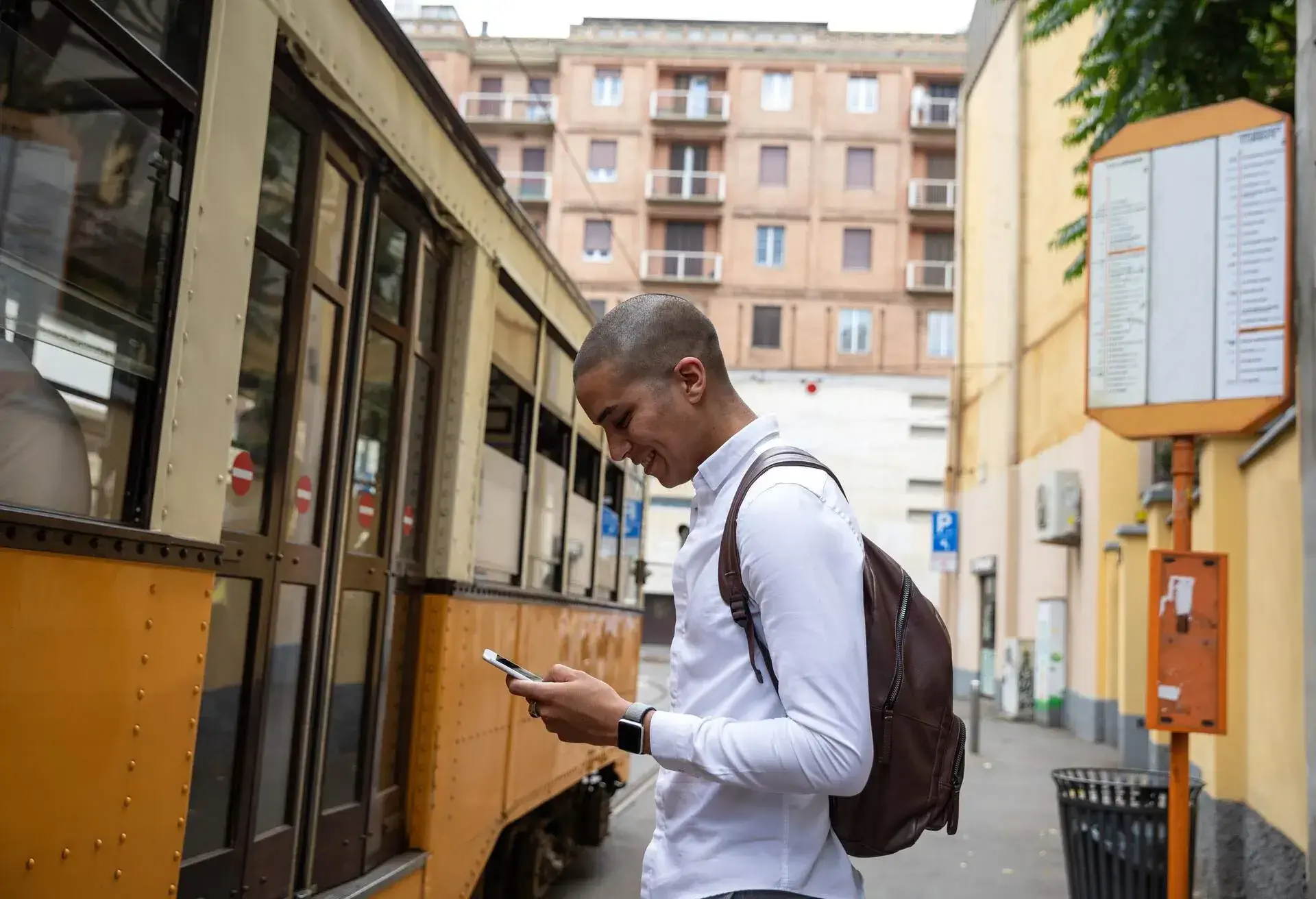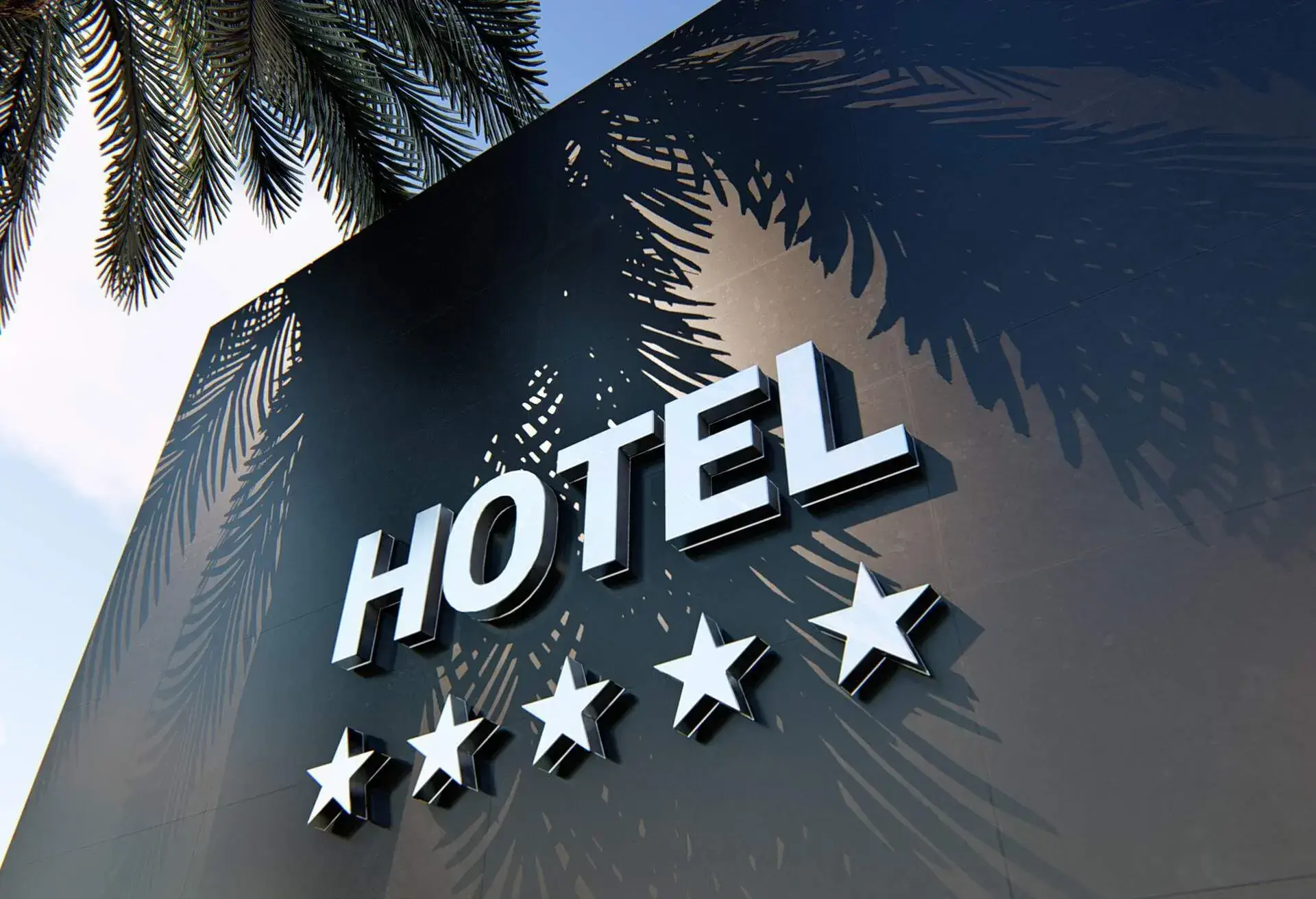Most hotels have a standard check-in time of around 3pm. Arrive earlier and you may end up having to wait before you can get into your room. Unless, that is, you can wrangle earlier access. Here’s what you need to know before trying for an early hotel check-in.
Whenever I know I’ll arrive at a hotel before my room is available, I try to get an early check-in. Is it always successful? No. Is it worth a try? Absolutely!
Quick tips to get an early check-in
For more details on each of these quick tips, read the ‘how can you check in early at a hotel‘ section below.
Can you check into a hotel at any time?
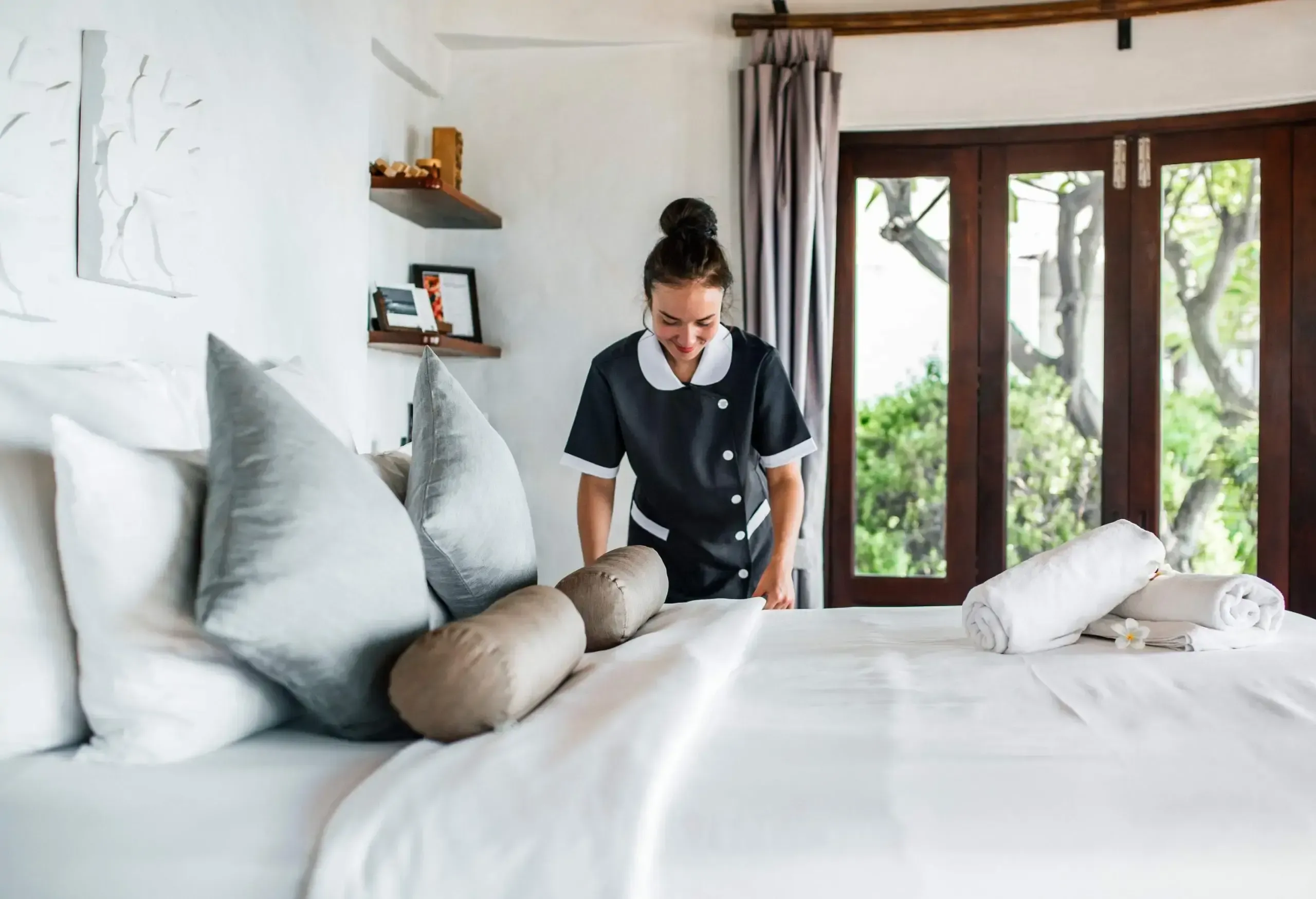
Whether they can let you into your room early depends on several factors:
| Availability | Whether you can check into your hotel room early is dependent on availability. Have the previous guests left, and has housekeeping had enough time to clean and prepare your room? I’ve found this to be largely down to luck, and it is hard to predict room to room and hotel to hotel. |
| Timing and occupancy | Early check-in often comes down to timing. Book a room mid-week in November in Paris, and you’ll have a great chance of getting into your room ahead of time. Whereas your chances in West London during Notting Hill Carnival weekend will be slim. |
| Your personal circumstances | Hotels may prioritise early check-in for people with special needs, medical requirements, or other special circumstances. |
How can you check in early at a hotel?
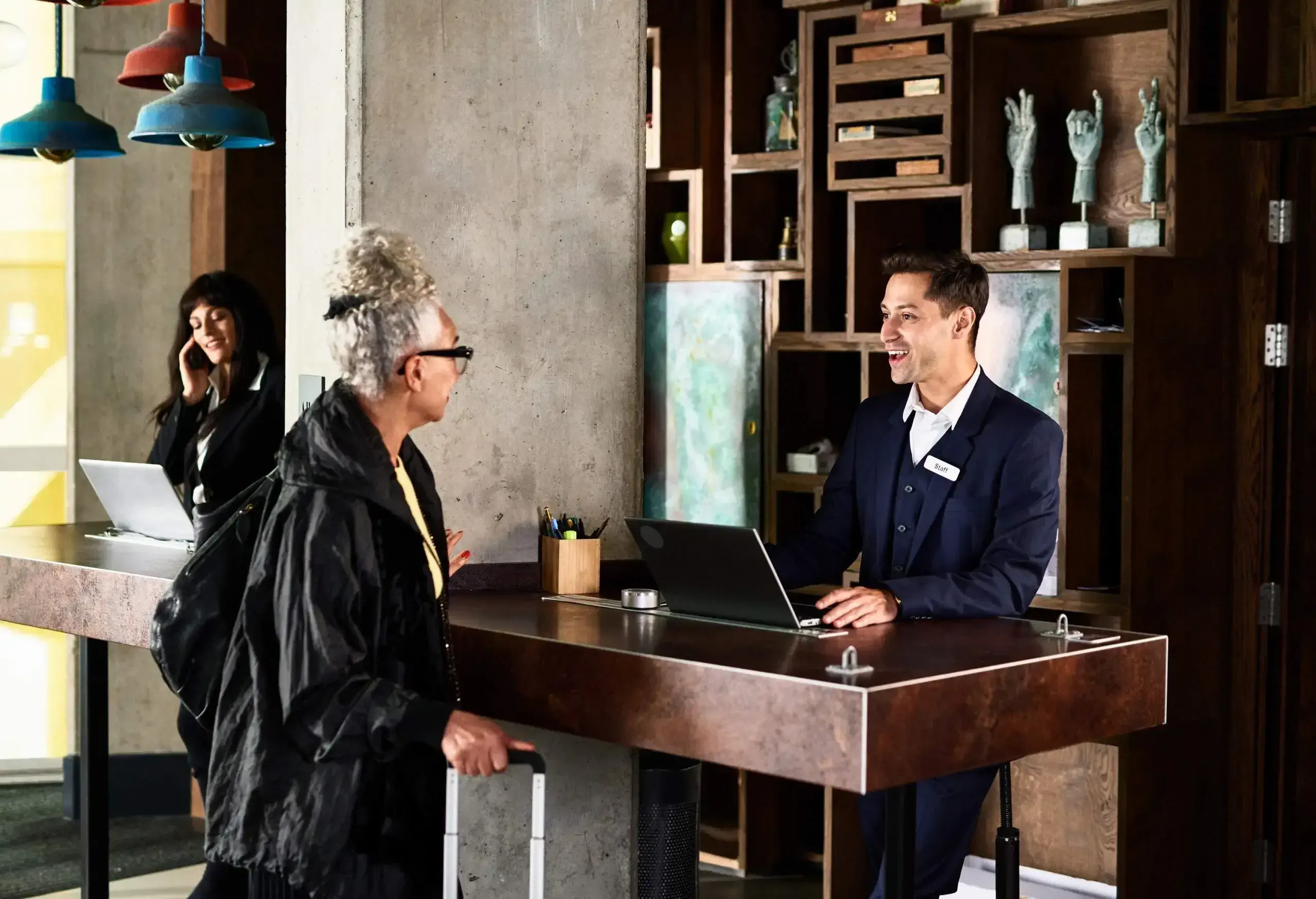
Securing an early check-in at hotels often comes down to timing and the hotel’s policies. Over the years, I’ve learned several other tricks that have helped me get early access to my room.
Research hotels with early check-in times before booking
When evaluating potential hotel options for a trip, I always take note of check-in times. You can look them up the hotel’s website, but I find it even easier to use KAYAK’s Hotel Search.
It helps you compare multiple properties by listing check-in and check-out times at the bottom of every individual hotel page. This makes comparing hotels and making a booking decision easier and faster. A popular example is The Hoxton,
Join hotel loyalty programmes
Many hotels, especially major global chains like Marriott Bonvoy and Hyatt, give early check-in preference to their loyalty programme members. The higher you go climb in tier status, the more sway you have in getting perks like early check-in. Some loyalty programmes explicitly list early check-in and late check-out as a benefit. These include:
- IHG One Rewards: Early check-in is published as a benefit for Platinum Elite and Diamond Elite guests.
- Marriott Bonvoy: Ambassador Elite members get a ‘Your24’ benefit that lets them choose their check-in time.
- World of Hyatt: Explorist and Globalist members can reserve a free 9am check-in. Those with lower tier Discoverist or basic member status can do the same for around £8.
Take advantage of credit card perks
In addition to hotel loyalty programmes, several major credit cards offer early check-in as a benefit. Check your credit cards to see if they offer any of these programmes:
- American Express Fine Hotels & Resorts. Offered to Amex Platinum, Business Platinum, or Centurion-branded American Express card holders. Allows members to book from more than 1,000 luxury hotels and receive extra perks, including midday check-in when available. I’ve had some success using this programme for early check-in but have also been denied thanks to high occupancy.
- Capital One Premier Collection. Launched in 2023, Capital One has its own luxury hotel programme available to those with Capital One Venture X personal or business cards. Early check-in is prioritised but depends on availability.
- Chase The Luxury Hotel & Resort Collection. Available only to Chase Sapphire Reserve cardholders, if you book through this Chase programme, you’ll get a slew of benefits, including early check-in, if available.
Downgrade or pay to upgrade your room
If the specific room type you booked isn’t available, the front desk staff may offer a downgraded room that’s sitting vacant. They may also give you the option of upgrading (and paying for) a more deluxe room, if one’s available.
Ask in advance for early check-in
If there’s no official route to book an early check-in or get it guaranteed through perks, just ask – but do it well in advance. Call and email explaining your situation and why it’s important.
Many of the major hotels and chains let you explicitly request early check-in (or offer a comments box for special requests) if you book through their app or website. If you ask directly, it’s worth doing it via email so you have proof in writing of your request and (hopefully) early check-in offer.
Ask about early check-in fees
While it shouldn’t be your first approach (because ideally you want it free), if there’s nothing available you can ask about paying to check in early. Many hotels have set fees for early check-in, usually available on their websites or apps, which may be worth paying depending on your situation.
Try mobile check-in
Mobile check-in is becoming more common, and I’ve used it successfully several times to get into my hotel room early. Recently, I had a reservation at a Marriott and used the app to request a midday check-in. At 11am, my phone buzzed to tell me my room was ready and gave me access to a mobile key.
Do hotel ratings impact early check-in?
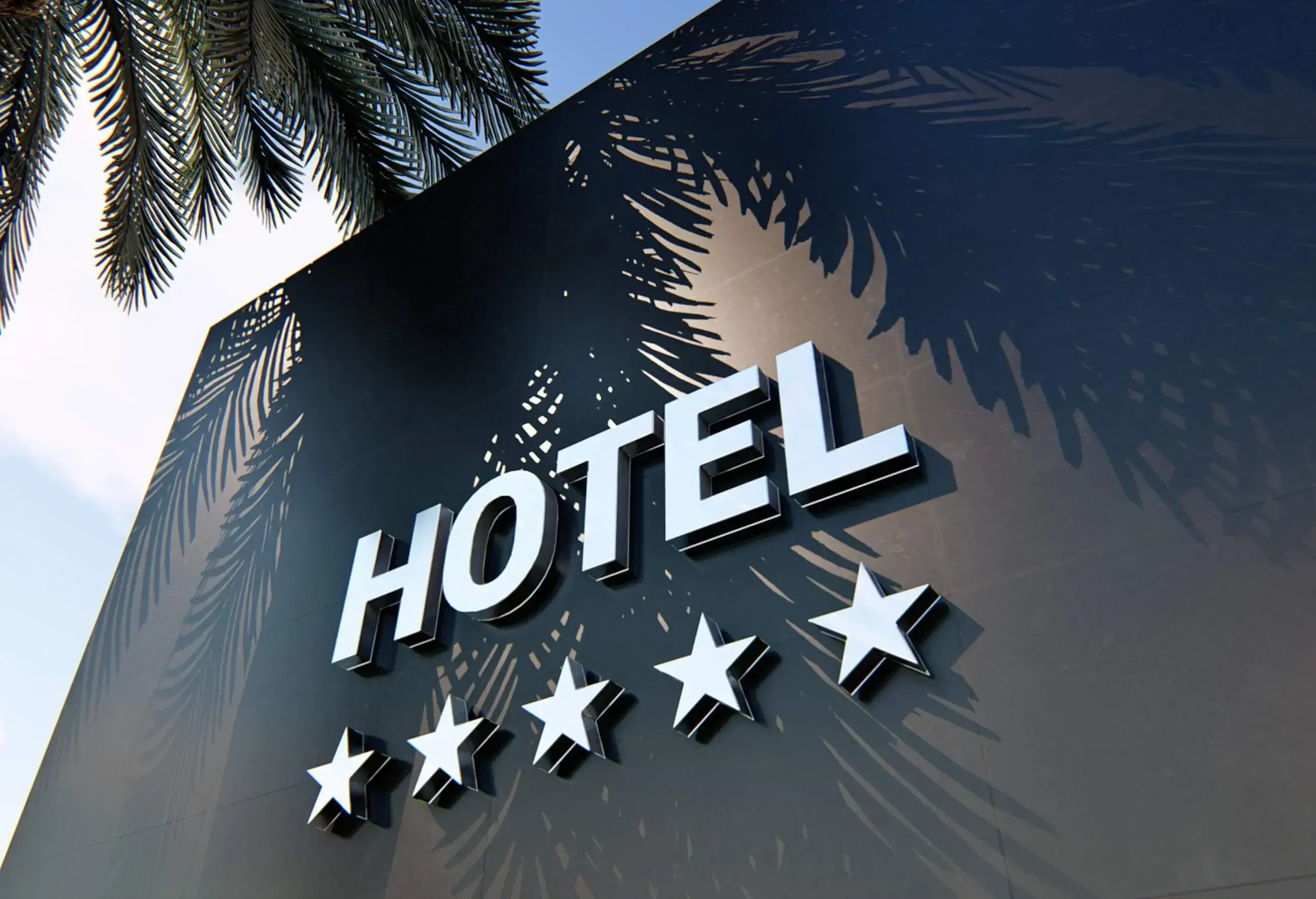
Compared to budget and mid-range hotels, luxury hotels usually go above and beyond to accommodate guest requests, including those for early check-in.
While not always the case, higher-end hotels tend to have better service standards, more robust loyalty programmes, and higher staff-to-guest ratios to provide a premium experience.
Long before customer hotel reviews became the norm, several travel companies and institutions have created well-respected hotel rating systems to help travellers work out where best to stay. Some have become the default rating systems within their own countries and beyond.
AA Hotel and Hospitality Services
The AA car breakdown service has a long history in the hospitality business and has been rating hotels on a three to five star scale for more than a century. It assesses and rates accommodation using a set of quality standards agreed between the AA and the UK tourist authorities. Each year it awards Inspector’s Choice stars to the best hotels in each rating, as well as Highly Recommended silver stars for top quality places to stay. A final Quality Assessed rating promises that minimum quality standards are met but with no star rating award.
Forbes Travel Guide
Using a rating system of one to five stars, the Forbes Travel Guide uses experienced, anonymous inspectors to meticulously evaluate a hotel’s amenities, accommodation and overall guest experience. A property with one star offers basic accommodations, while two stars are considered “comfortable”. Three-star hotels are “excellent”, and four-stars “exceptional”. Five-star hotels, the pinnacle of luxury, “offer an extraordinary level of personalised attention to detail”.
AAA Diamond Rating
A US institution in the same vein as the AA, the American Automobile Association AAA Diamond Rating awards hotels from one to five diamonds in place of stars. One-diamond properties offer no-frills while five-diamond hotels represent the epitome of luxury and sophistication. AAA Diamond Ratings are awarded by experienced inspectors who conduct unannounced visits to evaluate room quality, facilities, dining experiences, and overall ambiance.
MICHELIN Guide
While the MICHELIN Guide is best known for star rating restaurants, MICHELIN also rates select hotels with its MICHELIN Key guides. Launched in 2024, the guide gives every single hotel in its MICHELIN Guides a one to three key rating. While all its featured hotels “excel in design, architecture, service and personality, the MICHELIN Key denotes the absolute most outstanding experiences.
Is it worth checking into a hotel early?
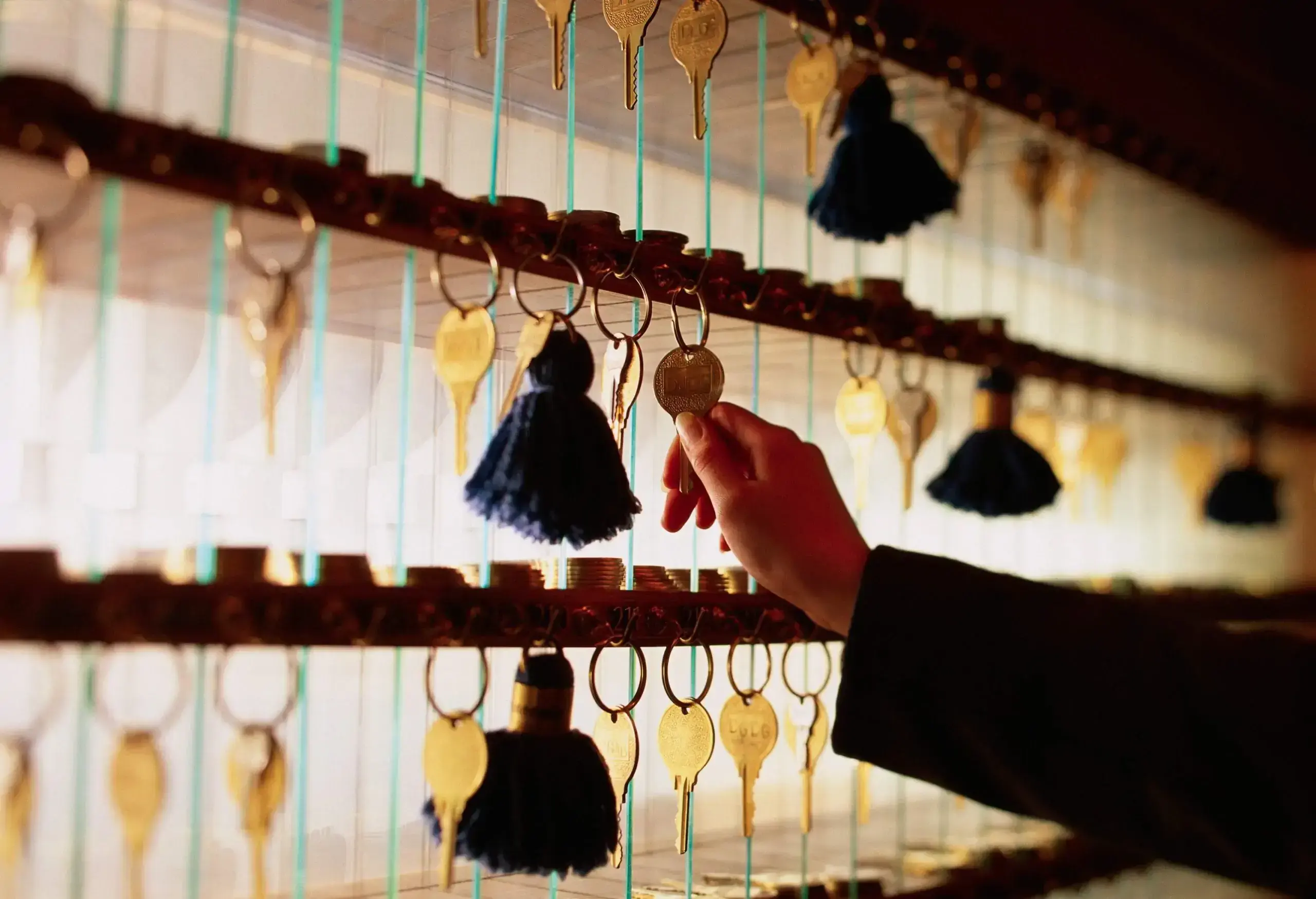
If you’re travelling far or have somewhere to be at a fixed time, getting early access to your room offers several advantages.
A chance to rest or freshen up
Travel days often mean an early wake-up, crossing time zones, long periods between washing. Early check-in gives you access to a comfortable bed to nap in before setting out on your adventures. Similarly, if you’re travelling with a baby or small children, getting them a quiet room to nap in can make your day a lot smoother.
After any form of travel, you may be craving a shower and a change of clothes. Early check-in means you can freshen up from the comfort and privacy of your room before you start exploring your destination.
Better value for money
Paying a nightly hotel rate doesn’t give you 24 hours in your room. At best, you can expect to arrive mid-afternoon. And standard check-out times usually run somewhere between 11am and midday. At best that gives you 20 hours. Getting in early means you can enjoy your room and stay longer, and get better value for money.
More convenient
Whether you’ve got an early meeting or a pre-booked city tour, getting into your room early helps. Drop your luggage, unpack, get settled and make your deadline without rushing or having to lug your luggage around.
A quiet place to work
With remote working now commonplace, so-called workations have become more popular. If you’re planning to work while you travel, getting into your hopefully quiet hotel room early can make that much easier and more productive.
What to do if you don’t get early check-in

While early check-in offers many advantages, it’s not guaranteed and shouldn’t be relied upon as such. Hotels have standard check-in times for a reason—to give them time to clean and prepare your room.
If a hotel can’t accommodate your request, be polite and understanding. The front desk staff can’t just make rooms magically available, and they’re likely acting on a system with little wiggle room. There are other things you can do, though.
- Ask the front desk to safely store your luggage so you can move around without it. I’ve never had a hotel refuse this request – just make sure you get a tag or receipt that corresponds to your bag and ask exactly where they’re storing it.
- If the hotel can’t take care of your luggage, you can always find storage at transport hubs like major bus and train stations and airports.
I love Bounce, a luggage storage app that shows secure places to stow your stuff nearby, usually at very reasonable prices.
Duncan Madden, expert travel writer
- Just because you can’t get into your room doesn’t mean you can’t use the hotel’s facilities in the meantime. If you can’t freshen up in your room, few things beat a swim, sauna and shower in a hotel’s spa as an alternative. Equally, if you need to work, ask about their business centre or quiet place – or even pull up a table in the hotel bar or café.
- Many hotels also offer to text or call when your room is ready should it become available earlier.
- In some cases, hotels have a courtesy room to use if yours isn’t ready. While not common practice, it doesn’t hurt to ask.
- If you’re flying in and know your hotel room won’t be ready, consider hanging at the airport and using an airport lounge. Even if you don’t get member access, you can usually pay to get in for a few hours to wash, recharge and eat something. They beat a hotel lobby every time.
If you absolutely have to get into your hotel room before check-in time, you have only one guaranteed course of action. Book a room for the night before, and let them know you’ll arrive early the next morning. It might be expensive, but at least you can arrive whenever you want.
How to check into a hotel
When arriving at a hotel, head to the front desk with your ID and credit card ready. Confirm you’re happy with your room type and any special requests you made – single, twin or double beds, adjoining rooms, particular views and the like.
Typically, the concierge will provide you with keys and instructions to your room and give you an overview of the amenities and policies. If you’re driving, you can usually park directly in front of the hotel to check in and unload your bags before moving your car to a parking spot. If a porter helps you with your bags, consider giving them a tip.
Once inside your room, check that it’s what you requested and to your liking. If you need to request a different room for some reason, do it right away.
Having travelled extensively and stayed in numerous hotels, I’ve come up with my own list of things a little easier once you’re in the hotel:
Tips to speed up the check-in process
- If you want early check-in, make sure that you’ve spoken to the hotel in advance to see if it’s possible.
- If you’re travelling with a pet, make sure the hotel knows and is happy with it. Just because a hotel says it’s dog friendly doesn’t mean they’ll give you and your pack of huskies free reign. Email the hotel in advance to check explicitly that your pet is okay, and keep copies of your correspondence so you can back up your claim should problems arise.
- Got a specific request, like a preferred view or floor? Tell the hotel well in advance so they have the best chance of accommodating it. Reiterate these requests to reception staff when you check in as they may have got lost in transit – it’s way easier to sort your room there and then than change it later.
What do you need to check into a hotel?
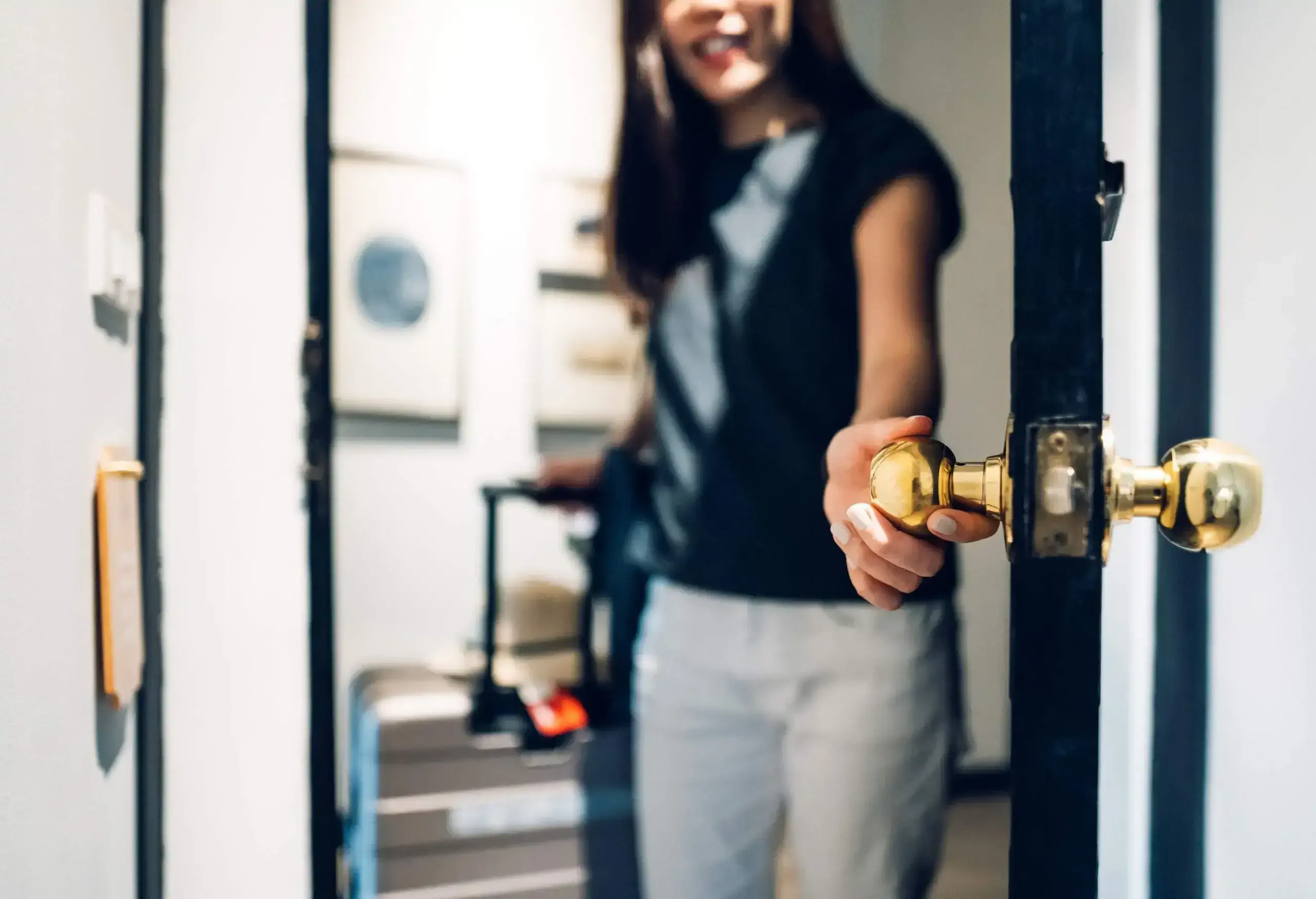
Checking into a hotel is fairly straightforward, but you do need to come prepared with a few documents and meet a few restrictions:
- ID: A driver’s licence or passport will suffice. If travelling abroad, the concierge may copy the front page of your passport to keep on file. Your name on your ID should match your reservation. Not yet 18? Check how old you have to be to book a hotel room before travelling.
- A credit card: A hotel will usually ask for a credit card in your name that can be charged in case of damage and to pay for food, drink and other charges you may accumulate.
- Reservation confirmation: It’s usually enough to give a hotel your last name to find your reservation, but it’s not a bad idea to have your reservation confirmation handy just in case.
How to get free hotel room upgrades
When checking into your hotel, it’s always worth asking for a room upgrade. Just like an early check-in request, this isn’t guaranteed and depends on availability. However, several approaches can increase your odds.
- Tell them you’re celebrating a special occasion like an anniversary or honeymoon.
- Be polite, friendly and respectful to the front desk staff.
- Use any hotel or credit card benefits that offer room upgrades as a perk.
Early check-in helps you make the most of your trip
While asking for a late check-out time is commonplace, getting an early check-in can be just as beneficial. I say, why not ask for both and extend your stay as much as possible! Simply, the more time you have, the more you can do and the more relaxed you can do it.
Hotels are there to provide a service that you’re paying for, so take advantage of it as much as possible. And if you can’t get an early check-in, take advantage of the hotel’s other facilities and amenities and let them know you’re waiting – you’re paying for it after all.
FAQs
Most hotels allow someone else to check in for you as long as they are added to the hotel reservation. To ensure a smooth process, contact the hotel in advance to ask about their policies and follow their instructions.
Hotels often list a time you need to check in before. But you can almost always check into a hotel later, even after midnight, as long as you let them know when you’re coming and they have a 24/7 front desk.
Hotel policies vary widely when it comes to the number of guests allowed in a room. Some aren’t concerned with it (unless the number of people starts to become excessive), while others have strict rules and will charge extra per guest. It’s best to check before booking.
Some hotels don’t have check-in deadlines, but for those that do, the cut-off is commonly between 6 pm and midnight. If you’re a no-show by that point, a hotel may give away your room. If you plan to arrive in the evening, it’s best to call ahead to let the hotel know.
There is no hard and fast fixed time for the earliest you can check into a hotel. Most hotels set their check-in time between 2pm and 4pm to allow them enough time to clean and prepare your room after the previous guests have left. You can always request an earlier check-in, but it’s usually at the hotel’s discretion.
Absolutely. Call as far in advance of your stay as possible to request an early check-in and see what the hotel’s policy is. While it’s seldom guaranteed and usually down to availability, asking lets the hotel know you’re interested. Always be polite and friendly when asking, as that can make a big difference to your chances of success. If they say yes, ask the hotel to email you confirmation so you have it in writing when you arrive.

